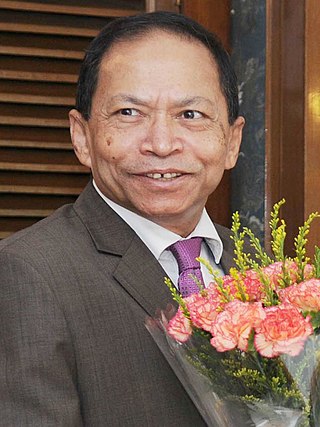Related Research Articles

The Constitution of Bangladesh is the supreme law of Bangladesh. Adopted by the 'controversial' and virtually "one-party" Constituent Assembly of Bangladesh on 4 November 1972, it came into effect on 16 December 1972. The Constitution establishes Bangladesh as a unitary parliamentary republic. Directly borrowing from the four tenets of Mujibism, the political ideology of Sheikh Mujibur Rahman, the constitution states nationalism, socialism, democracy and secularism as its four fundamental principles.
Abdur Rahman Biswas was a Bangladeshi politician. He was the President of Bangladesh from 1991 to 1996. Biswas represented Pakistan at the United Nations General Assembly, prior to the independence of Bangladesh.

Supreme Court of Bangladesh is the highest court of law in Bangladesh. It is composed of the High Court Division and the Appellate Division, and was created by Part VI Chapter I of the Constitution of Bangladesh adopted in 1972. This is also the office of the Chief Justice, Appellate Division Justices, and High Court Division Justices of Bangladesh. As of August 2024, there are 6 Justices in Appellate Division and 78 Justices in High Court Division.

Surendra Kumar Sinha, commonly known as SK Sinha is a Bangladeshi lawyer and jurist who served as the 21st Chief Justice of Bangladesh. He resigned from the position in November 2017 amid the 16th amendment verdict controversy.
Mohammad Tafazzul Islam is a Bangladeshi who served as the 17th Chief Justice of Bangladesh.

The Constitution of the People's Republic of Bangladesh was adopted by the Constituent Assembly on 4 November 1972 and became effective on 16 December 1972 one year after Bangladesh's victory in the War of Liberation. As of 2018 the Constitution has been amended 17 times. The procedure for amendments is demarcated in Article 142, a bill must be presented in the Jatiya Sangsad with the support of no less than two-thirds of all its members . Amending the Constitution of Bangladesh is the process of making changes to the nation's supreme law.
Tariq ul Hakim is a retired justice of the Supreme Court of Bangladesh.
The term judicial review is not expressly used in Bangladeshi law, but Article 102 of the Constitution of Bangladesh allows writ petitions to be filed at the High Court Division for reviewing the actions of public authorities, or suspending proceedings in lower courts. The article has caused significant judicial activism in Bangladesh.
Muhammad Imman Ali is a retired justice in the Appellate Division of the Bangladesh Supreme Court. He is dual Nationality Bangladeshi/British.
M Enayetur Rahim is a retired justice on the Appellate Division of Bangladesh Supreme Court. Earlier, he was justice of the High Court Division, Bangladesh Supreme Court. He also served as the chairman of the International Crimes Tribunal 1. He is the president of the Bangladesh Judicial Service Commission.
Farid Ahmed is a judge of the High Court Division of Bangladesh Supreme Court.
Md. Nazrul Islam Talukder is a judge of the High Court Division of Bangladesh Supreme Court. He is a member of Bangladesh Judicial Service Commission.
Md. Miftah Uddin Choudhury is a judge on the High Court Division of Bangladesh Supreme Court.
Md. Emdadul Huq is a judge of the High Court Division of the Bangladesh Supreme Court.
The Jail Killing refers to the murder of four leaders of the Awami League political party in Bangladesh by army officers who carried out a coup d'état there on 15 August 1975. The four killed were former President Syed Nazrul Islam, former prime ministers Tajuddin Ahmad and Muhammad Mansur Ali, and President of Awami League A. H. M Qamaruzzaman.
Quazi Reza-Ul Hoque was a judge in the High Court Division of the Bangladesh Supreme Court.
Md. Ashraful Kamal is a Justice in the High Court Division of the Bangladesh Supreme Court.
Shahed Nuruddin is a Justice of the High Court Division of the Bangladesh Supreme Court. He was the trial judge in the 2004 Dhaka grenade attack case.
Sheikh Rezowan Ali is a retired justice of the High Court Division of the Bangladesh Supreme Court.
Khademul Islam Chowdhury is a retired Justice of the High Court Division of the Bangladesh Supreme Court. He was chairperson of the Chittagong Hill Tracts Land Dispute Resolution Commission.
References
- ↑ "Former law commission chair Justice Abdur Rashid dies - - observerbd.com". The Daily Observer. Retrieved 2024-07-05.
- ↑ "Law and Our Rights". archive.thedailystar.net. Retrieved 2024-07-05.
- 1 2 3 4 5 "Law commission chief resigns". Bdnews24.com . 19 October 2010. Retrieved 5 July 2024.
- 1 2 3 4 5 6 7 "Justice Abdur Rashid dies". New Age. 24 October 2023. Retrieved 4 July 2024.
- 1 2 "16th amendment: Former judge Abdur Rashid advises Supreme Court to rewrite verdict". 16th amendment: Former judge Abdur Rashid advises Supreme Court to rewrite verdict. Retrieved 2024-07-05.